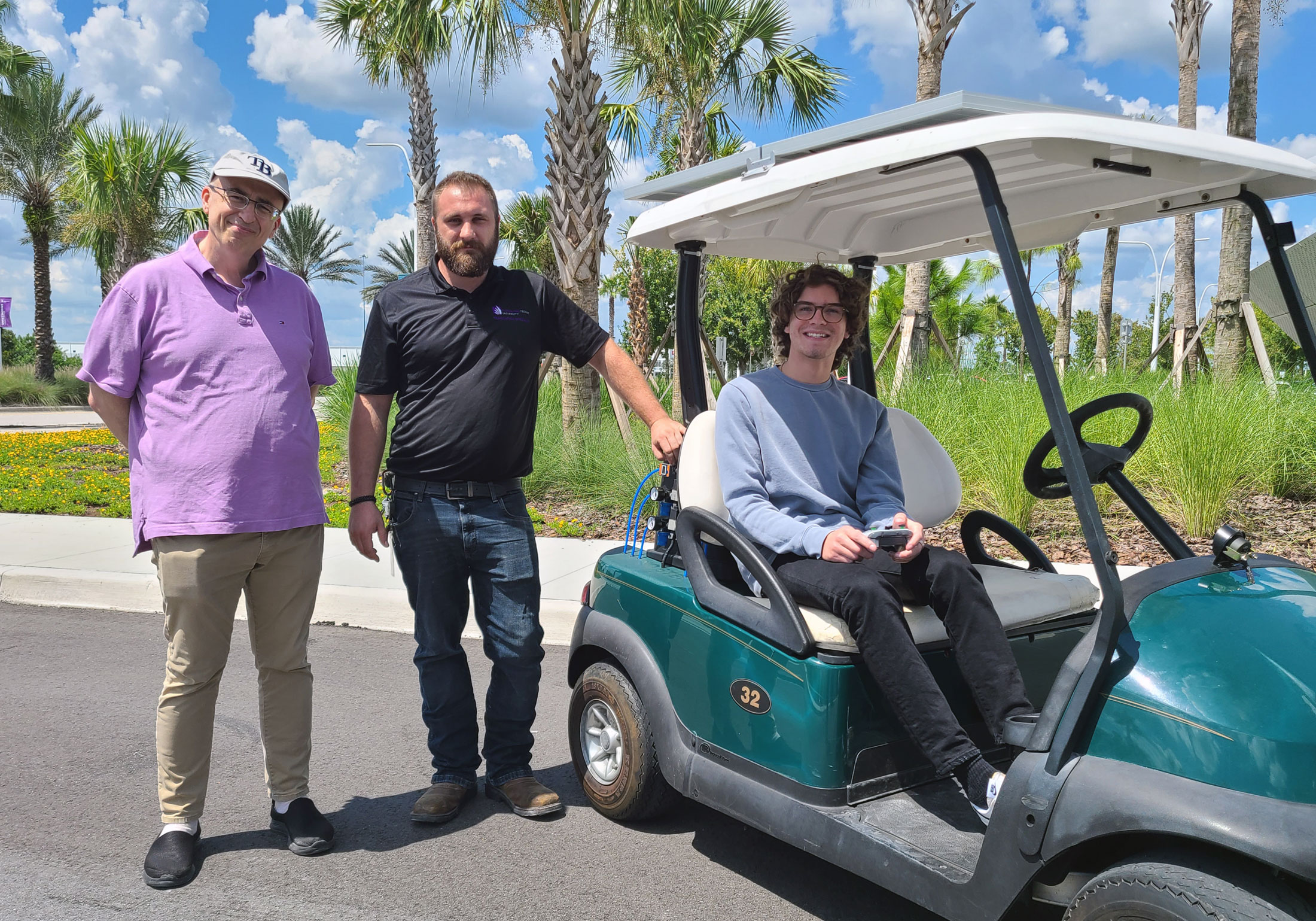
Dr. Onur Toker (left), associate professor of electrical and computer engineering; Mike Kalman, fabrication specialist, and Matthew DeCicco, a junior majoring in mechanical engineering, demonstrate a golf cart that has been transformed from traditional operation to drive-by-wire operation at Florida Polytechnic University.
A project to turn a standard golf cart into an autonomous vehicle has made a huge leap forward at Florida Polytechnic University. The students and faculty have successfully transformed the golf cart into a drive-by-wire vehicle – one that can be controlled by remote control.
The Florida Poly community can often see the solar-powered golf cart zipping around campus with its driver in the passenger seat holding an Xbox controller. The solar panels enable to vehicle to charge on the go, extending its range and dependence on traditional chargers.
“I’m quite happy about the project,” said Dr. Onur Toker, associate professor of electrical and computer engineering and an advisor for the project. “Over the last two years, about 10 students contributed, and now we have something really cool to demonstrate to undergraduate students. It’s better than we anticipated.”
Most recently, mechanical engineering student Matthew DeCicco has embraced a large role taking the project to its complete drive-by-wire milestone. His work included adding electrical circuits, completing mechanical modifications, and manufacturing custom mechanical parts. This helped take the project from its early stages as a vehicle that had limited motion to one that is very responsive and able to drive a regular golf cart would.
“When I came in, it had solar panels, which a graduate student had done, and they had pneumatics for the brakes, but the control system was not finished yet, so I had a lot of creative freedom to do what I wanted with it,” said DeCicco, a junior from Granby, Colorado. “It felt nice to be able to put my own touch on it.”
Currently, the golf cart can be controlled manually, by serial commands, or by the Xbox controller or a touchscreen.
Toker said work on the golf cart will continue. He said adding cameras and other missing components will move the golf cart another step forward in making the vehicle autonomous or semi-autonomous.
“This will get the image from the camera and decide about the best steering level, acceleration level, and brake level,” Toker said. “We have started looking at AI algorithms that will decide about steering.”
The process of completing all the work to make this golf cart fully autonomous will take several more years, he said.
“Probably for the next five years, it will be one of the most popular projects for our undergraduate students,” Toker said. “Students are really interested in understanding how the AI system works, and what kinds of mechanical and AI systems you need to install to make it drive by wire.”
Dr. Mohammad Reza Khalghani, assistant professor of electrical and computer engineering and an advisor on the project, said vehicles like drive-by-wire or autonomous golf carts can have many applications.
“We have many retirement communities, theme parks, and educational centers in Florida, and maybe some people don’t want to drive – we can use these low-speed vehicles to transport them from one place to another,” Khalghani said. “It is indeed a more environmentally friendly and comfortable transportation means.”
The golf cart project is funded by Florida Poly’s Advanced Mobility Institute.
Contact:
Lydia Guzmán
Director of Communications
863-874-8557